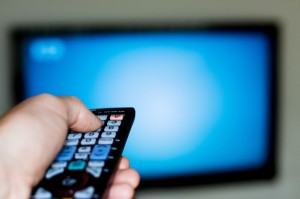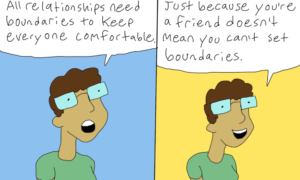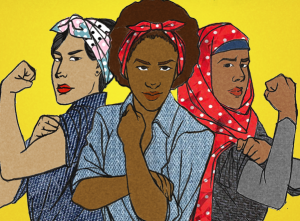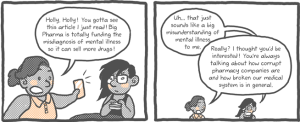
Source: VA Lawyers Weekly
If you’re anything like me, you spend countless hours binge-watching your favorite television shows, dancing to the songs that move you, and just generally consuming a lot of media.
That means that it is inevitable that some of the things you encounter and love are problematic. After all, we just don’t live in that feminist utopia we dream of (at least not yet).
So what are we do to do when we encounter something that we love that is also deeply problematic? When nearly everything we come across utilizes narratives about gender, race, and sexuality in ways we just aren’t down with as activists, what should we do?
There is no need to write yourself off for loving something that doesn’t fit into a feminist framework. You aren’t a bad person for loving a song with misogynist lyrics or for getting caught up in the latest season of Game of Thrones.
As the Social Justice League writes in their guide to being a fan of problematic things, we can expect texts to be problematic because they are created by humans, and the truth is that we are all imperfect.
However, it is still our responsibility as feminists to learn to consume that media responsibly.
It is one thing to recognize why and how something you like is problematic and not make excuses for it. It is another to constantly try to ignore problematic elements or justify your participation in something without giving it another thought.
Luckily, learning how to be a responsible consumer of media is easier than you might think.
Try these tips for being a fan of problematic things without ditching your feminist lens:
1. Think Critically About It
This is the part that will come naturally to many of us, especially if you’ve been a feminist for a while. Apply the same lens you might use to look at other parts of society to the things you like.
We all know that when a politician says something about women submitting to men, there is a problem. But do you often think about the more subtle ways your favorite band suggests the same thing in their debut album? Or how that book you love engages in this sort of rhetoric in order to enforce the submissiveness of women as the norm?
You may not have, but it is time to give it another look.
It isn’t always as easy as recognizing what is there. Often, the reason why something you love is flawed is because of what isn’t there.
Representation matters, and the way people are represented (or not) in the media you consume is important to think and talk about.
Consider the range of experiences that exist and which of those is being privileged in the media you are consuming. This means thinking about skin color, sexuality, gender, body types, ability, and so on.
All of these things matter, and all of these people deserve representation.
The last component to this piece of the puzzle is to consider the history and context of the media.
It doesn’t exist in a vacuum, and neither do we, so consider what has led up to this piece of media’s creation. It may not be so bad on its own, but it could fit into larger problematic narratives, reinforce oppressive norms, or further marginalize groups of people.
2. Don’t Make Excuses for It
Yes, you love it. We know. It is often hard to criticize something we care about, especially if we have emotional connections to it. However, just because something had a major positive impact on your life does not absolve it of critique.
The truth is, these texts, songs, and films don’t just impact us. They are widely available to rest of the public.
They represent the same norms, expectations, and beliefs held by our larger culture and society. That means that it is important to consider how these texts impact those beyond ourselves.
For example, consider the impact it could have on a young girl to see only one kind of body and one skin color plastered across your favorite fashion magazine.
Not making excuses for the media you love also means being open to personal critique from others about it.
Be open to being called out, it is part of the learning process. Nobody gets it right 100%of the time, so when it happens, welcome the learning experience.
Don’t make excuses for it. Just listen.
You may also encounter a couple of instances where you think something isn’t problematic, but someone else sees it differently. That’s okay, too.
Since our individual experiences impact the way that we interpret media, you will eventually encounter a time when someone else’s interpretation doesn’t match yours.
Be open to alternative interpretations that are problematic.
Consider why you see things differently, and if the reason you didn’t see it to begin with was impacted by your own privilege.
3. Consider Where to Draw the Line
At the end of the day, some things just aren’t redeemable. You may not always be able to reconcile your feminist self with some of the things out there and some of the things that you like.
That might mean eliminating certain things in your life that can’t be redeemed if you can’t reconcile something with the amount of damage it inflicts.
I can’t tell you where to draw the line, but I can tell you that a line needs to be drawn.
Think about where the boundaries are, discuss them with people whose opinions you respect, and discuss them with the people who are impacted by where these lines might be.
4. Keep Advocating for Better
In my opinion, one of the most important pieces of consuming problematic media is not to prop it up as being okay. The end goal is still change.
We need more representation of the diverse people who actually exist. We need more complexity to these representations when they do occur. We need the problematic narratives so common in our media to be dropped.
We can’t keep changing the goal post just because we were really into the latest superhero movie that came out. If we don’t keep advocating for these changes, we may never see them happen.
Although it is perfectly fine to love things that are problematic when you do it responsibly, that doesn’t mean you shouldn’t also support less problematic pieces of media.
Since feminist media is often left out of the mainstream, lending your support when great things do pop up isn’t just important, it is essential. Doing so ensures that similar works will continue to be made.
So when you hear a song that incredibly feminist, share it with your friends. When you watch a movie that pushes back against harmful stereotypes, tell people about it.
Luckily, there are tons of great organizations and people out there doing amazing work that deals with media literacy and representation.
The Representation Project runs a fantastic campaign that allows people to tweet about the media that they see that is either a really good and empowering representations of women (#MediaWeLike) or a really bad representations (#NotBuyingIt).
SPARK is another great project working to end the sexualized representation of women and girls in the media by empowering girls.
You can also make a difference on your own by talking about media with others on and offline. Use your social media spaces and blogs to engage with media makers about what good media looks like while calling out problematic aspects of the things you love.
Then take the conversation offline by having conversations about the problematic aspects of media when you encounter them.
Use these opportunities to start discussions not only about what the problems with these pieces of media are, but also about what it would look like to move beyond these problems.
***
Putting all of these steps into practice may come with some difficulty at first, but remember that what you’re doing here is retraining your brain to think differently about the media we encounter every day.
Don’t be afraid to indulge in something because it doesn’t fit perfectly into the social justice framework you advocate for, but do be sure you’re putting in the necessary work to engage with it critically.
You’re not a bad person for liking something that is problematic, but by putting in the extra work, you can put your feminism into practice and start to make a difference.
[do_widget id=”text-101″]
Want to discuss this further? Visit our online forum and start a post!
Ally Boghun is a Contributing Writer at Everyday Feminism. She is a feminist activist and media researcher living and working in Washington, DC. Ally completed both her B.A. in Communications and Art History as well as her M.S. in Professional Communications at Clark University, where she researched abortion debate rhetoric. She is also the founder and editor of Because I am a Woman, a blog devoted to intersectional feminism and reproductive justice. In her spare time, you can find her at an art museum, consuming massive amounts of coffee while writing, or trying to convince her cat to go for walk. You can follow Ally on Twitter @AllyBoguhn. Read her articles here.
Search our 3000+ articles!
Read our articles about:
Our online racial justice training
Used by hundreds of universities, non-profits, and businesses.
Click to learn more




















